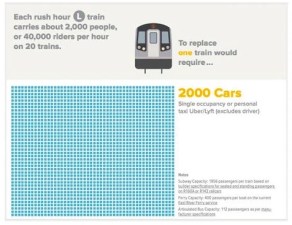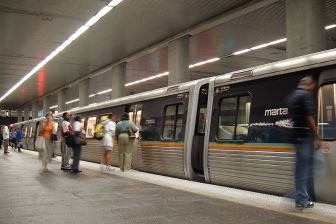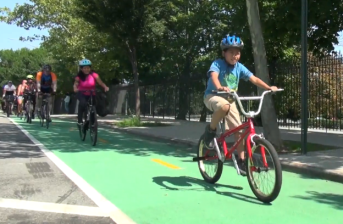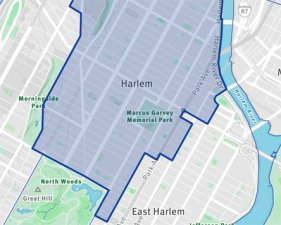Here’s How NYC’s 2017 Candidates Can Get Behind Better Transit, Biking, and Walking
The subways are mainly Governor Cuomo's job, but there's a lot city officials can do to improve streets and transit in the five boroughs.
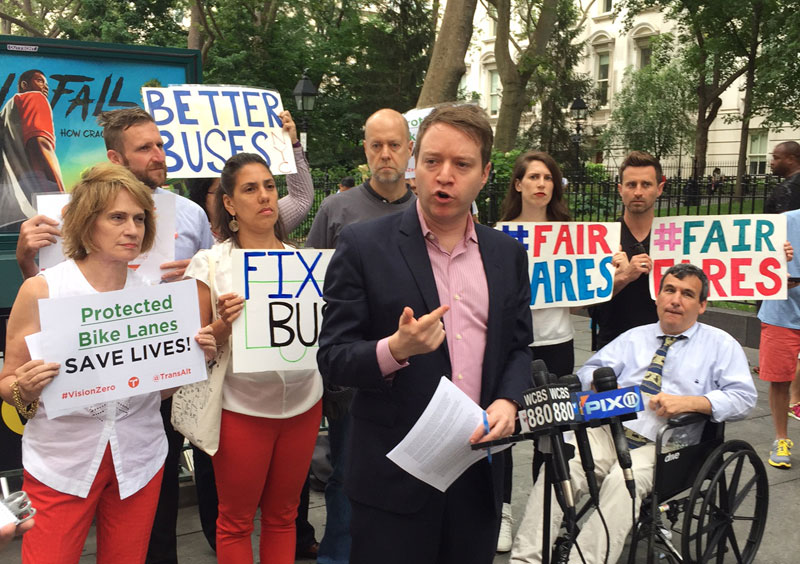
With primaries for all New York City elected offices coming up in just a few months, advocates have a message for the candidates: The ability to get around without owning a car is what underpins economic opportunity in NYC, and it’s up to local elected officials to deliver better conditions for transit, biking, and walking.
“Transit is the main reason why NYC is the city of opportunity that it is,” said Regional Plan Association New York Director Pierina Sanchez at a launch event outside the City Hall R train station this morning. She was speaking from personal experience: Growing up in Fordham in the Bronx, Sanchez said, the subway was the only way she could get to SAT prep classes in Sunnyside, Queens.
The advocates’ “Transportation and Equity Agenda,” released today, details an eight-tier policy platform [PDF], covering transit, street design, parking, and other levers at the city’s disposal. The Riders Alliance, Transportation Alternatives, Tri-State Transportation Campaign, Regional Plan Association, Pratt Center for Community Development, StreetsPAC, NYPIRG’s Straphangers Campaign, and the League of Conservation Voters will be asking everyone running for NYC office to sign on to the agenda.
“There’s no doubt that Governor Cuomo must come up with a plan to fund and fix the MTA, but that doesn’t mean there’s nothing the city can do,” said Riders Alliance Executive Director John Raskin. “Everybody who’s up for election in 2017 has a role to play.”
The mayor and the City Council have powerful means to shape the transportation system through their jurisdiction over streets, zoning, and law enforcement. “A lot of these solutions amount to getting more out of our streets,” said TransAlt Executive Director Paul Steely White.
Among the coalition’s recommendations:
- Improve bus speeds and reliability by expanding Select Bus Service and implementing the recommendations of the Bus Turnaround campaign.
- Double bicycling mode-share by 2020 by expanding bike-share to more neighborhoods and installing protected bike lanes on major streets.
- Eliminate parking minimums and repurpose street parking to make room for commercial deliveries.
- Fund the Fair Fares program so more New Yorkers can afford access to subways and buses.
Notably absent from the list are two high-profile components of Mayor de Blasio’s first term agenda: the proposed Brooklyn-Queens streetcar and the recently-launched citywide ferry service. While the coalition doesn’t take a stance on those initiatives, it’s telling that they were left out of the recommendations.
What’s new about the platform isn’t the policy recommendations — it’s the strategy of packaging them together as a platform for office-seekers to adopt. “This should be incorporated into every candidate’s platform,” said Tri-State Executive Director Veronica Vanterpool.
Before the primaries, TransAlt will be holding candidate forums in competitive council districts to discuss transportation issues. The exact districts have yet to be identified.
“I think there’s great interest among candidates in transportation, but they don’t know what to do,” Raskin said. “We’re here to tell them what they can do.”
With reporting from Ben Fried.

